#chthonic gods
Photo
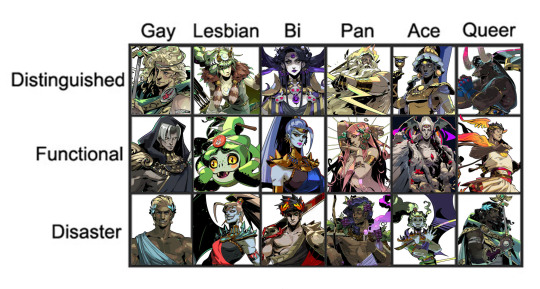
#hades#hades game#hades supergiant#greek mythology#greek gods#chthonic gods#greek mythology memes#hades memes#zagreus#thanatos#achilles hades#theseus hades#dionysus hades#zeus hades#chaos hades#nyx hades#thanatos hades#aphrodite hades#megara hadies#furies#the erinyes#hermes hades#tisiphone hades#alecto hades#asterius hades#patroclus hades#lgbtq#lgbtq memes#distinguished gay#alignment chart
1K notes
·
View notes
Text

😭😭😭 Pls not this fic telling Chthonic deities discussing overpopulation and implying Apollo made covid I can’t----- 🤣🤣🤣🤣
#this is such a delight#nico di angelo#hecate (pjo)#hermes (pjo)#pjo#hoo#toa#percy jackson and the olympians#fanfic talk again bc what’s new anw?#fic rec#pjo fic rec#yone rambling#chthonic gods
290 notes
·
View notes
Text
Hades & Persephone worshippers: Research boost
[I'm sharing this call for survey participant with permission.]


Transcript
Are you a Hellenic polytheist who worships Persephone and/or Hades? If so, I’d like to invite you to participate in a research project that will look at how Hellenic Polytheists engage with ancient evidence.
Participation will be via an online survey that will take 15-30 minutes and include a series of questions about your interests and your religious practice and ask you to undertake three interpretation tasks.
Participation in voluntary, and you can contact me for more information at ellie.mackinroberts(@)bristol.ac.uk.
Link: https://arts.onlinesurveys.ac.uk/dread-persephone-and-lord-hades
Why am I doing this study? I’m doing this study to try and understand how modern Hellenic Polytheists interpret and engage with ancient source material, and how their understanding of the ancient contexts adds to this interpretation.
My hope is to draw some conclusions about how professional ancient historians may be able to assist in the informed research of Hellenic polytheists.
Further context
Dr Ellie Mackin Roberts has been active in academia for a while and some of you may know some of her work, the most notable and recent of which being Underworld Gods in Ancient Greek Religion: Death and Reciprocity, which was her PhD thesis. Others may also know her since she is active on TikTok.
If you are looking for information as to the context of this particular survey and how the information will be used, you can find some info on the survey itself:
https://arts.onlinesurveys.ac.uk/dread-persephone-and-lord-hades as well as on her blogpost https://elliemackinroberts.net/2023/08/30/my-first-survey/
but the TL;DR is that she is currently writing a chapter for an upcoming book titled Persephone in Love: Persephone and Hades in Popular Culture in which she intends to study how modern worshippers of Persephone and Hades approach ancient sources.
-
@micromeria you might already know about this, but thought I'd tag you in case this wasn't the case.
#hades deity#hades worship#persephone deity#persephone worship#hellenic pagan#hellenic polytheism#hellenic deities#hellenic gods#hellenic polythiest#theoi#theoi worship#hellenic paganism#helpol#hellenic pantheon#hellenic worship#research#chthonic gods
133 notes
·
View notes
Text


I like drawing Nyx. She has a wonderful design.
#hades supergiant#supergiant hades#supergiant games#supergiant fanart#hades game#hades art#hades fanart#greek mythology#chthonic gods#chtonic#nyx goddess#nyx art#goddess nyx#nyx hades#my fanart#fanart#my art#my artwork#art#artist#artwork#my drawing#drawing#traditonal art#traditional drawing#artist on tumblr#artists on tumblr
163 notes
·
View notes
Text





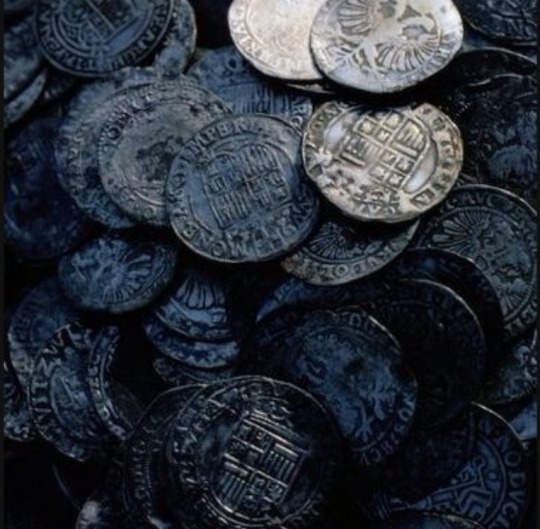



Cernunnos
Gaulish God of liminality, crossroads, death, pastoral wealth, abundance, hunters, the hunted, the wild, and the tame.
#Cernunnos#Carnonos#Karnonos#gaulish gods#gaulish paganism#gualish polytheism#gallo roman paganism#gallic gods#celtic paganism#celtic pagan#celtic pantheon#pagan#deities#polytheism#polytheist#deity#paganism#devotional moodboard#deity moodboard#the horned god#the horned one#wicca#wiccan#paganblr#chthonic#chthonic gods#godspouse#moodboard
34 notes
·
View notes
Photo
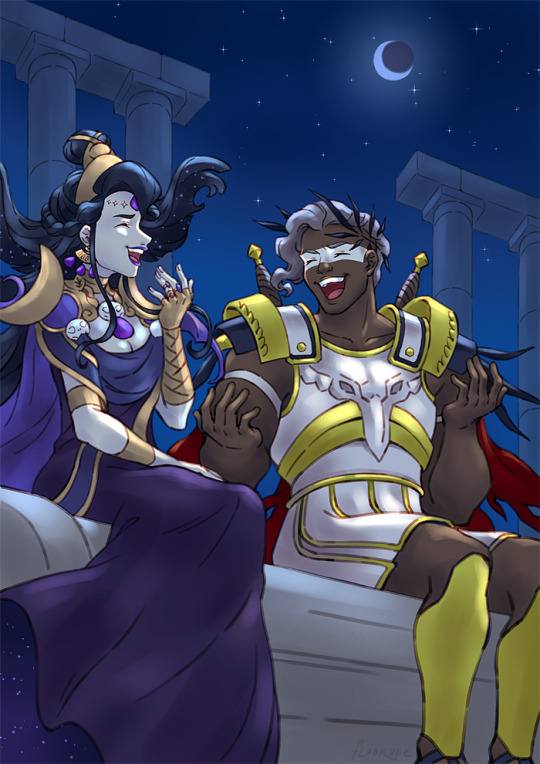
the piece i did last year for @ares-zine!! if i was ares i would also insist on meeting up with mama nyx. he's just like me fr :]
leftover sales end on Sunday at 1pm EST! there's still some merch and zine PDFs left so get 'em while you still can 🌃🌙✨
#hades#hades game#hades supergiant#ares#ares hades#hades ares#nyx#nyx hades#hades nyx#hades game zine#hades game fanart#supergiant games#greek mythology#olympian gods#chthonic gods#my art#floorune art
671 notes
·
View notes
Text
Chthonic Kids and their partners!









Hypnos, Nemesis, and Hecate are included because they can be. Left to right up to down is Bianca and Nico di Angelo (Black and Italikim mixed), Ariel Brown, Lou Ellen Blackstone (Ottowa), Hazel Lavesque, Lavinia Asimov, Ethan Nakamura, Clovis (Black and albino), and Malcolm Pace (Lenape)!
#pjo#hoo#toa#chthonic gods#chthonic demigods#bianca di angelo#nico di angelo#ariel brown#niciel#lou ellen blackstone#hazel lavesque#lavinia asimov#hazivinia#ethan nakamura#clovis pjo#malcolm pace#malclov#my si
37 notes
·
View notes
Text
Astrology Quick-Lists: The Chthonic Gods of the Hellenic Pantheon
Recorded for myself, published for your reference. I suggest referencing both Western and Vedic, and personally prioritize aspects when analyzing asteroids. Disclaimer in bio.
The term "chthonic gods" refers to gods who rule over the passing of time and the cycle of life and death. Thus it encompasses the agrarian gods, who ruled over agriculture, harvest, and seasonal growth, as well as the gods of the underworld, who obviously preside over funerary rites, the afterlife, and the occult.
Below I've compiled lists of relevant asteroids and objects. Check out this post if you'd like help figuring out which are prominent in your natal or synastry chart.
Objects for the King of the Underworld
The domain of Pluto includes funeral rites, necromancy and ghosts, curses and the Erinyes, dreams, mining and metals, and the Earth's fertility.
Pluto [134340] - Latin name
Orcus [90482] - Latin name
Disa [1319] - Latin name
Hades [h41] - Greek name
Haidea [368] - Green name
Hadano [39799] - Greek name derivation
Aida [861] - Etruscan Name
Polyxenos [22227] - epithet, meaning "Host to Many"
Summanus [11885] - epithet, referring to the ruler of the nocturnal heavens
134340,90482,1319,h41,368,39799,861,22227,11885
Objects for the Queen of the Underworld
The domain of Proserpine includes passage to Elysium, necromancy and ghosts, divine rectitude, the Arae and the Erinyes, and spring growth and grain.
Persephone [399] - Greek name
Proserpina [26] - Latin name
Proserpina [h57] - Latin name
Cora [504] - epithet, meaning "maiden"
Praxedis [547] - epithet, meaning "exacter of justice"
Agni [398188] - epithet, meaning "holy; pure"
Protogenia [147] - epithet, meaning "first-born", referring to her role as the first-born daughter of Ceres
399,26,h57,504,547,398188,147
Objects for the Underworld Itself
Hades [h41] - Greek name
Haidea [368] - Greek name
Aida [861] - Greek name
Leuceus [11351] - Greek name derivation, specifically in reference to the Elysium Fields
h41,368,861,11351
Objects for the Goddess of the Field
The domain of Ceres includes agriculture and the harvest, the seasons, law and order, the Eleusinian mysteries, and aspects of the afterlife.
Ceres [1] - Latin name
Demeter [1108] - Greek name
Chloe [408] - epithet, meaning "green; first shoots"
Panacea [2878] - epithet, meaning "of all the Greeks"
Erin [2167] - epithet derivation, meaning "fury; wrath"
Melena [25085] - epithet, meaning "the black"
Lucia [222] - epithet, meaning "bathing; purifying"
1,1108,408,2878,2167,25085,222
Objects for the Seasons Themselves
Winters [15111]
Autumn [5461]
Summerfield [7344]
15111,5461,7344
Objects for the King and Queen's Retinues
Mercury - Latin name, the messenger god who often was cast as the guide of the dead
Hermes [69230] - Greek name for Mercury
Hekate [100] - Greek name, the goddess of witchcraft and ghosts among other forms of magic, the guide who aided in Demeter's search for Persephone, and the minister to Persephone and her companion in Hades
Furia [194982] - Latin name for the Furies, a group of female goddesses of vengeance and retribution
Erin [2167] - Greek name for the Furies, derivation
Tisiphone [466] - Greek name, one of the three Furies, the fury of "murder retribution"
Alekto [465] - Greek name, one of the three Furies, the "unceasing" fury
Megaira [464] - Greek name, one of the three Furies, the "grudging" fury
Ara [849] - Latin name for the Curses, a group of female daemones similar to or otherwise the same as the Furies
Arai [5070] - Greek name for the Curses
Minos [6239] - Greek name, one of three judges of the dead who was awarded his status for establishing law as king of Crete
Rhadamanthus [38083] - Greek name, one of three judges of the dead and the king of the Elysian Fields who was awarded his status for his just work as a lawmaker in life
Cerberus [1865] - Greek name, guard dog of the dead
Deira [1244] - Greek name, a nymph of the underworld and a favorite companion of Persephone, often connected to the Eleusinian Mysteries
69230,100,194982,2167,466,465,464,849,5070,
6239,38083,1865,1244
Objects for the Goddess of the Field's Retinue
Eunomia [15] - Greek name, one of the Horae (Seasons)
Dike [99] - Greek name, one of the Horae (Seasons)
Irene [14] - Greek name, one of the Horae (Seasons)
Gaea [1184] - Greek name, the primordial titaness of the Earth
Pluto [134340] - Greek name derivation, minor god of wealth and harvest
Carpi [66207] - Greek name, minor gods of the fruits
Iasus [353189] - Greek name, consort of Demeter
15,99,14,1184,134340,66207,353189
Objects for Others who Dwell in the Underworld
Saturn - Latin name, the king of the Titans and god of time, formerly imprisoned in the Underworld after his defeat at the hands of the Olympians, later freed and made king of the Elysian Islands, famous for devouring his children for fear of being overthrown
Kronos [h43] - Greek name for Saturn
Nyx [3908] - Greek name for the primordial goddess of night
Moira [638] - 1) Greek name, derivation, for the Fates; 2) Greek name, a term for death
Klotho [97] - Greek name, one of the three Fates, the Spinner who spun the thread of life
Lachesis [120] - Greek name, one of the three Fates, the Apportioner of Lots who measured the thread of life
Atropos [273] - Greek name, one of the three Fates, the Cutter of the thread of life, referred to as "she who cannot be turned"
Morpheus [4197] - Latin and Greek name, leader of the spirits of dreams and messenger of the gods favored to visit kings
Hypnos [14827] - Greek name, the god of sleep
Mors-Somnus [341520] - Latin name, the god of gentle death
Amphiaraos [10247] - Greek name, a hero transformed into a subterranean oracular daemon
Lameia [248] - 1) Greek name, an underworld-dwelling monster disguised as a beautiful woman whose original real form had a serpent tail in place of legs; 2) Greek name, a type of ghost that acted as companions to Hekate
Lampos [55678] - Greek name derivation, for the Lampades, the torch-bearing nymphs of the underworld and companions to Hekate during night-time revelry, and the divine counterparts to mortal partakers in the Eleusinian Mysteries
Sisyphus [1866] - Greek name, a mortal tasked to eternally push a boulder uphill as recompense for the crime of capturing death in a sack in an attempt for immortality
Tantalus [2102] - Greek name, a king condemned to unending hunger and thirst for fruit and water just out of reach as recompense for tricking guests into cannibalism
Eurydike [75] - Greek name, read about her and Orpheus here
Orpheus [3361] - Greek name
h43,3908,638,97,120,273,4197,14827
341520,10247,248,55678,1866,2102,2102,75,3361
*This list is NOT exhaustive. There are simply too many stories which evoke the underworld, the seasons, or any of the gods who rule over either for me to put on one list. In fact, you'd be hard-pressed to find a myth that doesn't eventually get tied back to one or the other. These are the most essential players whose key significance is tied to the chthonic cycles and themes.
Thanks for reading and I hope you found it helpful. I hope to do more quick lists like this, if others are interested, so feel free to let me know which pantheons and domains would most help.
#astrology#asteroids#persephone#hades#underworld#demeter#chthonic gods#hellenic pantheon#hellenic gods#roman gods#greek gods#roman mythology#greek mythology#hellenic mythology#ceres#proserpina#pluto#hermes#mercury#hekate#mine#authored#long post
163 notes
·
View notes
Photo

Part of my original art series “Interstellar Olympus”, a reimagining of Greek mythology combined with elements of space. You can purchase prints or wall tapestries of this series at my Online Store
Starting out Set III with lots of chthonic gods and goddesses, even the lesser-known ones like Macaria and The Palici. What underrated god/goddess would you like to see next?
#saresai#saresai art#Interstellar Olympus Series#Greek Mythology#greek gods#greek myth#Thanatos#God of Death#Digital Illustration#digital art#stars#space art#Mors#chthonic gods#Found a new font for the Names I don't hate but still not quite happy with it...#I'll have to keep looking
80 notes
·
View notes
Text
All the depths
Of earth I traverse: - where her caverns lie
Darkest and nethermost I pass, and here
Uprising look once more upon the Stars,
And in my course I saw her! Yea, these eyes,
As past the Stygian realm my waters rolled,
Proserpina beheld! Still sad she seemed,
And still her cheek some trace of terror wore,
But all a Queen, and, in that dismal world,
Greatest in place and majesty, - the wife
Of that tremendous God who rules in Hell.
Ovid, Metamorphoses
#proserpina#pluto#hades#hell#chthonic gods#ovid#roman polytheism#greek mythology#metamorphoses#paganism
14 notes
·
View notes
Photo

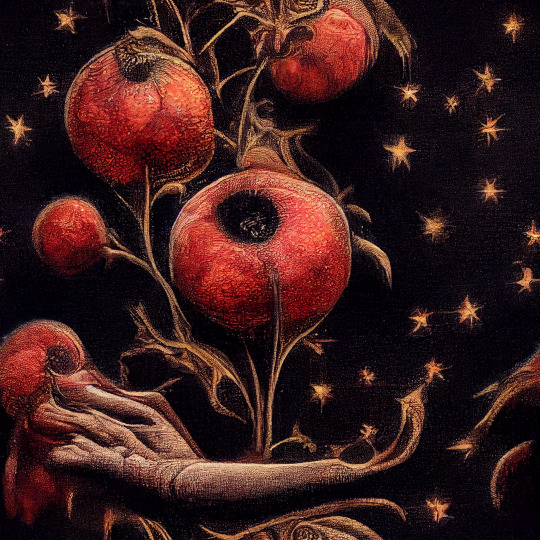
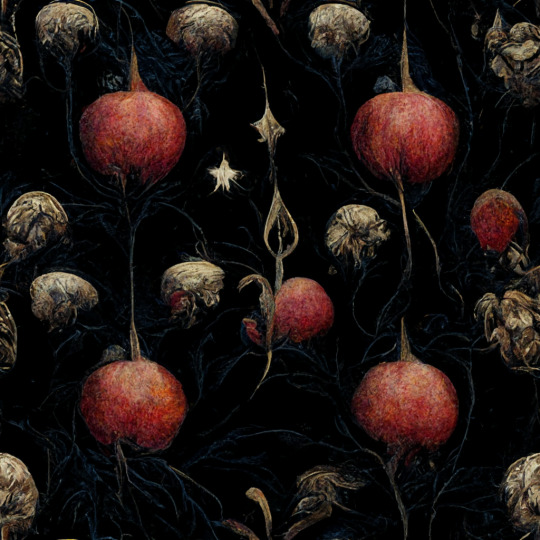







Welcome Home Persephone!
Recently, MidJourney made the ability to create seamless tiles. So, of course, I made Halloween ones IMMEDIATELY. But, today I made a couple pomegranates & flowers. For our Queen of the Dead & Goddess of Spring. Flowers to tide us over until she brings more.
Happy Mabon!
(Bonus textured pumpkin tiles for those more harvest & less spooky)
#ai artwork#ai art#midjourney#mabon#fall equinox#pomegranate#roses#persephone#hades#persephone x hades#hades x persephone#chthonic#underworld#chthonic gods
119 notes
·
View notes
Text
Zagreus Devotional Activities
Time for more Zagreus content!
Great devotional activities include:
listening to music (more on that below)
spending time with your friends and inviting him to join
self... pleasure, or self-care in general
playing guitar and/or singing
and reading books that he likes!
He likes rock/punk music. He's a BIG MCR guy (his favorite album is Danger Days, but his favorite SONG is probably This Is How I Disappear). My playlist for him will be in another post! He also enjoys the occasional lo-fi (like Lost and Found by Purrple Cat).
He seems to enjoy video games, he wanted me to play more of Supergiant's Hades (even if he doesn't look or sound like that Zagreus), and he wanted to join my roommate and I when we were playing Mario Party last night. He's a fun guy. Invite him into your fun.
Finally, he seems to really enjoy books. I'd been pulled to finally read a series my friends have been talking about for months, and he said yes, it was him! This is going to sound silly, but the man really likes A Court of Thorns and Roses, apparently. He says he sees himself in Rhysand (and that he looks like a paler, green-eyed, bat wingless version of him). Some people say that ACOTAR is a Hades and Persephone allegory, so I can see where the connections are already for sure!
His FAVORITE book, according to my brief interrogation, is The Secret History by Donna Tartt. So I got a nice copy of that to read and then put on his altar.
Overall, he just wants you to be grounded, enjoy life in all its pleasures, and engage in intellectual and moral discipline. So do that however makes the most sense for you!
5 notes
·
View notes
Text
Does anyone have any experiences with chthonic deities?
For years I’ve had dreams of a pretty chthonic nature (O:) featuring certain recurring images and characters, it’s also a recurring theme during waking hours. It’s played a massive part in my life but I always maintained my interest in pagan gods/polytheism was totally academic since I wasn’t raised religious and didn’t want to seem crazy. I’m definitely at a point where I’m questioning that, for a while it had faded but after travelling to Greece and visiting the caves at Eleusis it’s come back. The idea of deities associated with death scares me though, I don’t want to tempt misfortune or something.
4 notes
·
View notes
Text

hades and hecate altar is so pretty recently
5 notes
·
View notes
Text

Made another one sketch of Goddess Nyx from Hades.
#hades game#supergiant hades#hades supergiant#hades art#hades fanart#house of hades#greek gods#chthonic gods#chthonic#nyx hades#nyx art#goddess nyx#nyx goddess#nyx#my fanart#fanart#my art#my artwork#artwork#artist#art#my drawings#my drawing#drawing#my sketches#paper sketch#sketch#traditonal art#traditional drawing#artist on tumblr
62 notes
·
View notes
Text
“Perhaps a better way of getting at what the Greeks thought of as a ‘chthonic’ god is to look at the use of ‘chthonic’ as a cult epithet. Epithets are a common and consistent feature of Greek religion during the archaic and classical period. Parker describes two distinct ways that cult epithets work: ‘one looks upwards, to the heavens: it differentiates and selects among the powers of the gods. One looks downwards: it gives names to the sanctuaries of the gods here on earth’. Underworld epithets, including the obvious ‘Chthonios’ and ‘Chthonia’, serve the same purpose as any other cult epithet yet they do not neatly fit into either of Parker’s categories. In a very real sense, they are toponymic. They refer to a specific place, namely beneath the ground. But they also function as a way to recall a divine function, namely being ‘of the place under the ground’ (i.e. in the soil, denoting the possible agrarian nature of the ‘chthonic’) or ‘of the Underworld’. And, of course, these two things are intricately interlinked – the function exists for and around the place, and the place exists for and around the function of Underworld and other death-related and agrarian gods. We find a plethora of examples of ‘Chthonios/a’ in literature, of which Hermes is the most frequent. In religious practice we find examples of Demeter Chthonia, Ge Chthonia, Hermes Chthonios, Persephone Chthonia, Zeus Chthonios, and Hekate Chthonia. Mentions of Chthoniai Theai more generally refer to Demeter and Persephone. For non-‘Chthonios/a’ epithets we find, for example, Hermes Pompaios (‘guide’) and Psychopompaios (‘guide of souls’), and Demeter and Ge Anesidora (‘sender up of gifts’). The inscriptional evidence also shows that the epithet Chthonios/a was widely applied to various divinities, over a large time frame. However, as Irene Polinskaya notes, use of the word as an epithet was not at all evenly distributed across the Greek world. Most instances occur in Magna Graecia, with significant numbers also found in Asia Minor and Attica, but much smaller numbers elsewhere.
While in religious practices ‘chthonic’ epithets usually indicate a god has some kind of Underworld or under-ground (that is, agrarian) function, in literature these epithets are usually used to indicate that a god should be conceptualised, by the audience rather than by the other characters, as a specific type of character. So, they are presented as either an agrarian or Underworld god in a single-faceted way, rather than having multifaceted traits that are ritually significant. Gods in literature often appear, as J Given comments regarding Dionysos in Aristophanes’s Frogs, ‘disconcertingly human’, and are very different to the way they are rendered in artefacts of religious practice. This is shown in the way other (predominantly mortal) characters interact with them, from their corporeal physicality (and therefore physical interaction), to the ways they are manipulated by other characters to advance the storylines. For instance, in ‘real life’ people tend to credit the gods for positive outcomes in their lives, but lay blame for bad at the feet of fortune, fate, or a daemon; in literature, blame for the negative is usually laid squarely with the gods, either generally or with a specific god. This does not always reflect the intricate, multi-directional relationship that people build with gods over time, though. Most instances in tragedy that involve the epithet Chthonios/a are, however, an indirect invocation to an absent divinity. So, what we often find in literary uses of the epithet is an attempt to say something about the direction of the narrative, rather than the ritual nature of the god being called upon.”
- Underworld Gods in Greek Religion: Death and Reciprocity by Ellie Mackin Roberts
6 notes
·
View notes